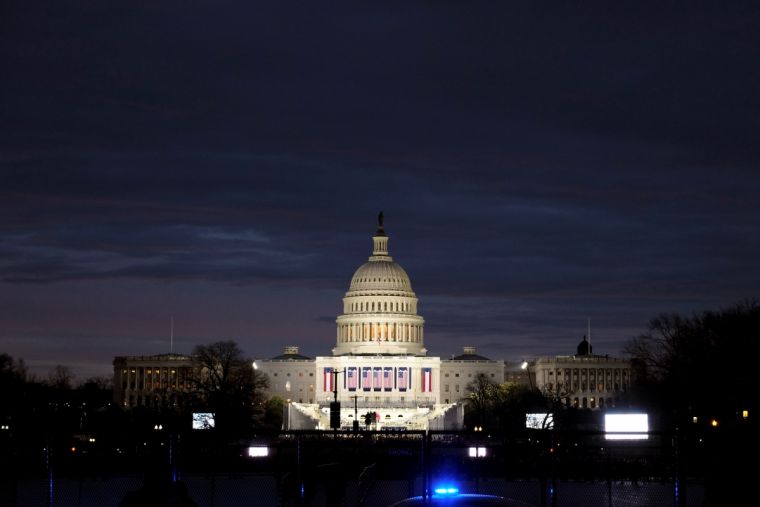Monster Or Messiah: How Should The Church Respond To Donald Trump?
Today Donald Trump will be sworn in as the president of the United States. Despite winning the election back in November, it's a startling reality that many are still struggling to reckon with. Trump has sharply divided the Christian community, with some delighting in his victory while others despair.

As Christians across the world look ahead to the unknown, how should they think, act, and pray under a Trump administration? Can groups that disagree also find ways to unite and learn from one another? Here are three kinds of Christian response to the reality of Trump.
"The Trump shall resound, and the Lord shall descend"
If the statistics are anything to go by, many US Christians will be celebrating today. After all, white evangelical Christians voted for Trump by an overwhelming majority. Some may have been more enthusiastic than others, but Trump's win came at a time when conservatives have often lamented religious decline and the advance of secularism. Evangelicals must be grateful that in what many see as a culture hostile to faith, they got the man they voted for. Trump has promised conservative justices for the Supreme Court and support for evangelicals on key social issues such as abortion and religious freedom. Many Christians see his Vice President Mike Pence as an even better example of a faithful conservative advocate.
Key Trump supporters like James Dobson, theologian Norman Geisler and televangelist Paula White represent enthusiastic support of the Trump administration. White has been dubbed Trump's "spiritual adviser" and will give an invocation prayer for him at the inauguration today. White enthused that Mr Trump has "a heart for God, a hunger for God".
Franklin Graham has supported Trump without officially endorsing him. He said that ahead of Trump's victory, he sensed that "God was getting ready to do something to change the direction" of America, and was intervening to "stop the godless, atheistic, progressive agenda from taking over our country".
Graham also called for a reversal of the division that has come to define American politics. Whatever one's politics, such an ambition is surely one that any Christian can embrace.
#NeverTrump
Despite his success among evangelicals, many influential Christians denounced Trump during the election and since. Influential Southern Baptist Russell Moore vehemently opposed Trump on account of his character and conduct, and called on others to do the same. Moore was something of a voice in the wilderness, and received criticism from other southern Baptists who didn't share his views. Another influential conservative pastor, John Piper today described Trump as "morally unqualified" to serve as president and denounced him on several counts.
Perhaps unsurprisingly those on the more progressive end of the Christian spectrum have voiced emphatic dissent about the advent of Trump. Rachel Held Evans has tweeted almost daily about how Trump's victory effectively endorses his abusive rhetoric, particularly towards minorities and women, and undermines the witness of Christians who once said that 'character counts'.
If you want to know how our culture responds to men who abuse, demean & objectify women, look no further than the Capitol steps on Friday.
— Rachel Held Evans (@rachelheldevans) January 18, 2017
Some Christians will be joining the Women's March in Washington DC tomorrow, marching for women's freedom, equality, and respect, and taking a stand against the presidency of one considered by many to be emblematic of misogyny.
Writer and activist Jim Wallis has spoken emphatically about the need to oppose the injustice that he sees Trump standing for. He has called the Church to renewed activism and protection of "the other" that Trump's rhetoric against minorities threatens. The President of the Episcopal Church in the US urged prayer and protest in response to Trump.
Now the election season has passed, there is a sense that even the more vocal critics recognise the need to pray and serve toward the ends they wish to see, not simply complain. The Church across the world has much to learn from its socially conscious, politically minded advocates who labour for the oppressed and long for justice. President Trump may help the Church remember what it actually stands for.
A third way?
Trump incites rage in some, optimism in others. His outspoken, abrasive style means that people tend to love him or loathe him. Some however, find themselves in that rare middle ground, still waiting to see what the future holds.
Voices like that of theologian Wayne Grudem may represent those who voted for Trump out of necessity, and now wait nervously to see what will happen. They may be cautiously optimistic, believing that despite his foibles, Trump may be able to generate some positive changes on issues such as the economy and mass-unemployment.
Influential Christian thinkers like Tim Keller have thus refrained from giving either political endorsement or damning critique, and perhaps in our divided age such a decision is actually quite wise. Mark Galli, editor of Christianity Today, has written about the need to resist polarisation, instead seeking reconciliation, good disagreement, and focusing on the true King of Kings.
The question of how Christians will respond to Trump is in many ways the question of how we will respond to each other. In both cases, there will be many complex factors and feelings involved. In both cases, hope and prayer will be vital. In both cases, the life and future of the Church will depend on one man, but his name isn't Donald J Trump.











